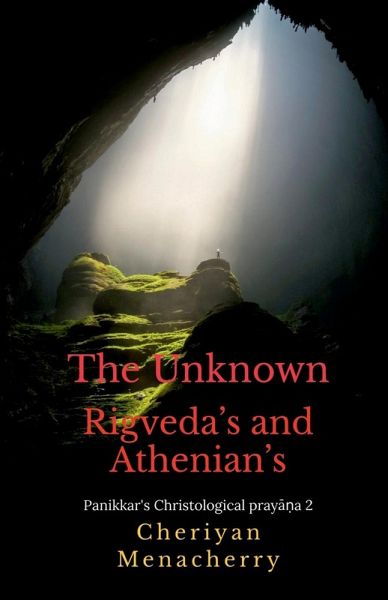
The Unknown Rigveda's and Athenian's
Panikkar's Christological prayāṇa 2
Versandkostenfrei!
Versandfertig in über 4 Wochen
15,99 €
inkl. MwSt.

PAYBACK Punkte
8 °P sammeln!
The Mediating Mystery CHRIST, although unknown, present in all religions, is Deo ignoto. Rigvedic expression 'what God' (kasmai devāya) (RV 10, 121, 1-9) is not a question but naming the unknown Mediator, the cosmotheandric principle, the prajāpati (RV 10, 121, 10). Athenians had an altar reserved for the unknown God, Agnostos Theos. Perceiving that the altar was for the unknown Mediator of the Athenians, St Paul preached Christ in Areopagus (Acts 17:22 ff.). The unknown CHRIST, which Christians call Jesus Christ, is unknown both to Hinduism and to Christianity. The Unknown God of Rigveda an...
The Mediating Mystery CHRIST, although unknown, present in all religions, is Deo ignoto. Rigvedic expression 'what God' (kasmai devāya) (RV 10, 121, 1-9) is not a question but naming the unknown Mediator, the cosmotheandric principle, the prajāpati (RV 10, 121, 10). Athenians had an altar reserved for the unknown God, Agnostos Theos. Perceiving that the altar was for the unknown Mediator of the Athenians, St Paul preached Christ in Areopagus (Acts 17:22 ff.). The unknown CHRIST, which Christians call Jesus Christ, is unknown both to Hinduism and to Christianity. The Unknown God of Rigveda and of Athenians, the second book of the series, Panikkar's Christological prayāṇa, deals more about Panikkar's explication of the principle of Mediation of an Absolute Brahman with the world analysing the Brahmasutra. Īśvara of Hindu scriptures is not explicitly about Christ. The Christ of Christians cannot be equated with Īśvara. Still, if one analyses the `sensus plenior', a fuller sense of humanity's philosophical and theological texts, one arrives at the `res significata', the intended thing of the advaitic Īśvara leading to the philosophical possibility of a Christ.














